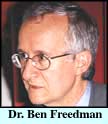 |
 18th April 19998 |
Front Page| |
What causes heart disease? Dr. Ben Freedman speaksBeware that bulgeBy Chamintha ThilakarathnaIs your waist larger than your hips? If you're one of those with a prominent bulge, then watch out. You may have heart disease without realizing it.
In Asian countries such as ours, a common phenomenon is for people to put on more fat around their midriffs with advancing age. "This is not a healthy sign. Experiments have revealed that people whose waists are larger than their hips are more prone to getting heart attacks than those who are slim," Dr. Freedman warned. "Asian nations are beginning to face issues that affected developed countries thirty years ago. It has been noticed that Asians living in countries like the UK, Malaysia and Singapore are more prone towards coronary heart diseases," he said. This, he explains, is due to the change in lifestyle and eating habits. He also said that the fact that Asians have a very starchy diet contributes to the disease. Dr. Freedman explains that coronary heart disease reached a peak in developed countries in the late 1950s and early 1960s but its incidence has declined since then. There has also been a major reduction in premature deaths. Although people still die from heart disease, it's at an older age. New epidemics in developing countries have been marked in South Asia where premature deaths are now starting to become a feature. "The total burden of cardiovascular disease, or the CVD, in South Asia is already high," he says. The rate of premature cardiovascular deaths usually of those younger than 70 years is a major concern. While 26% of CVD deaths are seen in developed countries, 52% occur in India and similar countries. According to Dr. Freedman, the risk factors for coronary artery disease are cholesterol, varieties of fats, high blood pressure, smoking, obesity, stress and diabetes. Smoking always multiplies the risks. Dietary changes, less exercise, and more tobacco and the priming effect of early poor nutrition are major factors in South Asia. "I don't believe that stress is a major problem. Lack of dietary control, I would say is a bigger problem. In some cases there are strong hereditary factors. And coconut could be very bad," Dr. Freedman said. The use of fats especially found in palm and coconut, high sugar, less fruits and vegetables/legumes are cited as reasons behind the dietary changes mentioned. Less exercise and people taking to car travel rather than on foot is another reason. He says that it is important for people to exercise regularly and not once in a while. However, over-exercise is inadvisable. This combination of less exercise and dietary changes leads to truncal obesity where the waist-hip ratio is over 0.9. Moderation, is the key, says Dr. Freedman. There is no need to cut down on the food items one eats, but the quantity. Another risk factor, he says, is alcohol. It causes strong negative correlation with coronary artery death, and too much will rot the brain and liver. But alcohol has the effect of stopping blood clots from forming inside the narrowed coronary arteries. Red wine is also preferable to white wine. Men are more prone to getting heart attacks than women. This, Dr. Freedman, explained was due to menstruation in young women. Even in the case of waist-hip ratio, it is men who display more risk while women need to take care of themselves as they grow older. In case you are looking for drugs to prevent heart attacks, "there is nothing as good as the common aspirin. Aspirin is the most effective. Try also cholesterol-lowering drugs but the cheapest is to change your lifestyle. In fact, it's cheaper and more effective," Dr. Freedman said. Heart attacks, usually occur according to his research during the early waking hours of the day. Although they have not found the actual reason for this, most cardiovascular problems and heart attacks have been observed between six in the morning and 12 noon. "The risk is usually in the first part of the day. We think that the reason probably is the blood stickiness during waking up or getting up. After a while of waking, the blood returns to normal condition. It is no good staying in bed longer," he said. Studies have revealed that in 49% of patients the usual delay from the time of awakening to the time of arising is one minute and in another 23%, 1-5 minutes. Heavy unaccustomed exercise, anger and sexual activity are other triggers of heart attacks, according to him.
Heart attackHeart attack occurs when a cholesterol rich plaque ruptures. This could lead to the formation of a clot inside the artery making the passage narrower. This in turn reduces the blood flow to the heart muscles. The heart muscles die and pump action gets gradually weakened. Dr. Freedman says that during the first few hours of this action, the risk is high but late risk occurs in those with poor pump function. Among the major complications of coronary artery disease is sudden death. Early warning symptoms include angina, chest pains, and breathlessness. |
||
 |
Front Page| News/Comment| Editorial/Opinion| Business| Sports | Mirror Magazine |
|
 |
Please send your comments and suggestions on this web site to |
|
 Dr.
Ben Freedman, Professor of Cardiology and Associate Dean, Central Clinical
School at the Department of Cardiology of the Concord Hospital of Australia,
visited Sri Lanka recently. Speaking to The Sunday Times he said that people
whose waist sizes were greater than their hip measurements are more at
risk of becoming heart patients.
Dr.
Ben Freedman, Professor of Cardiology and Associate Dean, Central Clinical
School at the Department of Cardiology of the Concord Hospital of Australia,
visited Sri Lanka recently. Speaking to The Sunday Times he said that people
whose waist sizes were greater than their hip measurements are more at
risk of becoming heart patients.